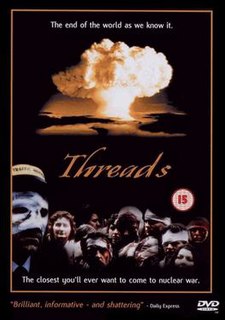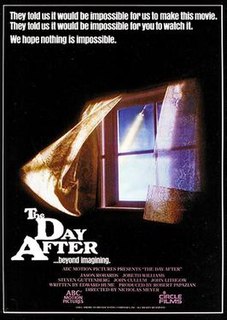
The Day After is an American television film that first aired on November 20, 1983, on the ABC television network. More than 100 million people, in nearly 39 million households, watched the program during its initial broadcast. With a 46 rating and a 62% share of the viewing audience during its initial broadcast, it was the seventh-highest-rated non-sports show up to that time and set a record as the highest-rated television film in history—a record it still held as recently as a 2009 report.

The War Game is a 1965 blend of television drama and documentary, that depicts a nuclear war. Written, directed and produced by Peter Watkins for the BBC's The Wednesday Play anthology series, it caused dismay within the BBC and also within government, and was subsequently withdrawn before the provisional screening date of 7 October 1965. The corporation said that "the effect of the film has been judged by the BBC to be too horrifying for the medium of broadcasting. It will, however, be shown to invited audiences..."
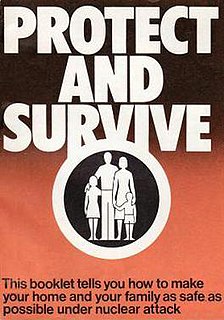
Protect and Survive was a public information series on civil defence produced by the British government during the late 1970s and early 1980s. It is intended to inform British citizens on how to protect themselves during a nuclear attack, and consists of a mixture of pamphlets, radio broadcasts, and public information films. The series had originally been intended for distribution only in the event of dire national emergency, but provoked such intense public interest that the pamphlets were authorised for general release.
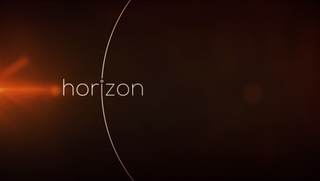
Horizon is an ongoing and long-running British documentary television series on BBC Two that covers science and philosophy.

William Woollard is a British television producer and presenter.
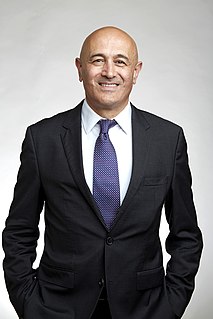
Jameel Sadik "Jim" Al-Khalili is a British theoretical physicist, author and broadcaster. He is Professor of Theoretical Physics and Chair in the Public Engagement in Science at the University of Surrey. He is a regular broadcaster and presenter of science programmes on BBC radio and television, and is a frequent commentator about science in other British media.
Liz Tucker is a British documentary producer and director. She joined the BBC in the early nineties, working initially as a radio producer before moving into television. She started her career on screen working on the show Tomorrow's World, where she told the story of Trevor Baylis, inventor of the Clockwork Radio. Following the publicity surrounding the film, Trevor shortly afterwards signed a deal resulting in the worldwide launch of his radio. While at the BBC, Tucker also worked on a range of documentary programmes/series including QED, Horizon and Life Before Birth. After leaving the BBC and working as a freelance director, she launched her own production company, Verve Productions, in 2007.

Visions of the Future is a 2007 documentary television series aired on the BBC Four television channel. The series stars theoretical physicist and futurist Michio Kaku as he documents cutting edge science.

Robert Eagle, is a British writer, producer and director of documentary and drama for film and television, now working in fine art.
Geoff Deehan is an award-winning film and television producer who has worked on projects such as The Heist and Equinox. He is also the creator and producer of the Plane Crash Documentary on Channel Four.
Peter Goodchild CChem FRSC is a former BBC television editor, who notably edited Horizon and who initiated the popular 1980s BBC science series Q.E.D..





